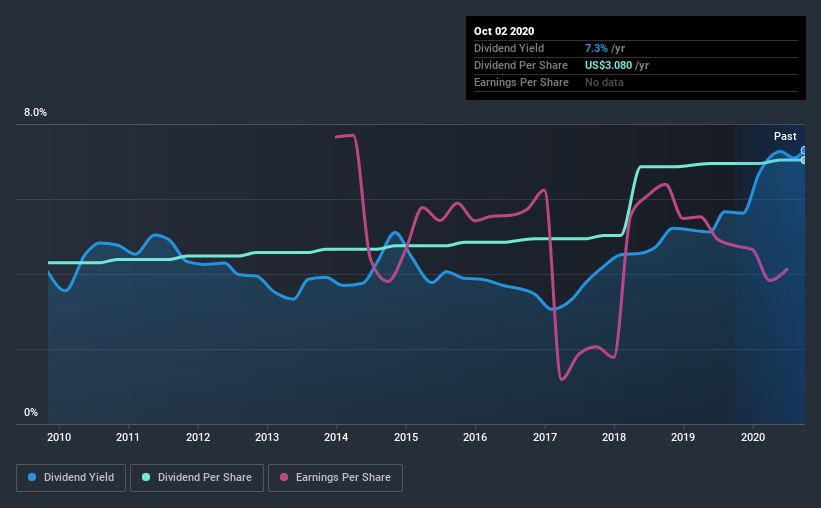It Might Not Be A Great Idea To Buy Universal Corporation (NYSE:UVV) For Its Next Dividend

It looks like Universal Corporation (NYSE:UVV) is about to go ex-dividend in the next 4 days. If you purchase the stock on or after the 8th of October, you won't be eligible to receive this dividend, when it is paid on the 2nd of November.
Universal's next dividend payment will be US$0.77 per share, and in the last 12 months, the company paid a total of US$3.08 per share. Looking at the last 12 months of distributions, Universal has a trailing yield of approximately 7.3% on its current stock price of $42.2. Dividends are a major contributor to investment returns for long term holders, but only if the dividend continues to be paid. That's why we should always check whether the dividend payments appear sustainable, and if the company is growing.
View our latest analysis for Universal
Dividends are usually paid out of company profits, so if a company pays out more than it earned then its dividend is usually at greater risk of being cut. Last year, Universal paid out 99% of its income as dividends, which is above a level that we're comfortable with, especially if the company needs to reinvest in its business. Yet cash flow is typically more important than profit for assessing dividend sustainability, so we should always check if the company generated enough cash to afford its dividend. It paid out 84% of its free cash flow as dividends, which is within usual limits but will limit the company's ability to lift the dividend if there's no growth.
It's good to see that while Universal's dividends were not well covered by profits, at least they are affordable from a cash perspective. Still, if this were to happen repeatedly, we'd be concerned about whether the dividend is sustainable in a downturn.
Click here to see how much of its profit Universal paid out over the last 12 months.
Have Earnings And Dividends Been Growing?
Businesses with shrinking earnings are tricky from a dividend perspective. If earnings decline and the company is forced to cut its dividend, investors could watch the value of their investment go up in smoke. Universal's earnings per share have fallen at approximately 6.5% a year over the previous five years. Such a sharp decline casts doubt on the future sustainability of the dividend.
Another key way to measure a company's dividend prospects is by measuring its historical rate of dividend growth. In the past 10 years, Universal has increased its dividend at approximately 5.1% a year on average. The only way to pay higher dividends when earnings are shrinking is either to pay out a larger percentage of profits, spend cash from the balance sheet, or borrow the money. Universal is already paying out a high percentage of its income, so without earnings growth, we're doubtful of whether this dividend will grow much in the future.
The Bottom Line
Is Universal worth buying for its dividend? It's never fun to see a company's earnings per share in retreat. What's more, Universal is paying out a majority of its earnings and over half its free cash flow. It's hard to say if the business has the financial resources and time to turn things around without cutting the dividend. With the way things are shaping up from a dividend perspective, we'd be inclined to steer clear of Universal.
Having said that, if you're looking at this stock without much concern for the dividend, you should still be familiar of the risks involved with Universal. For example - Universal has 1 warning sign we think you should be aware of.
We wouldn't recommend just buying the first dividend stock you see, though. Here's a list of interesting dividend stocks with a greater than 2% yield and an upcoming dividend.
This article by Simply Wall St is general in nature. It does not constitute a recommendation to buy or sell any stock, and does not take account of your objectives, or your financial situation. We aim to bring you long-term focused analysis driven by fundamental data. Note that our analysis may not factor in the latest price-sensitive company announcements or qualitative material. Simply Wall St has no position in any stocks mentioned.
Have feedback on this article? Concerned about the content? Get in touch with us directly. Alternatively, email editorial-team@simplywallst.com.


